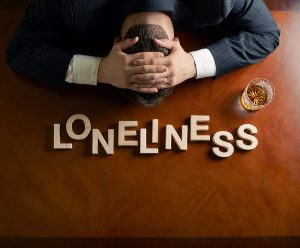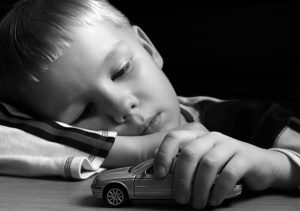A Way Out of Loneliness
 Every one of us will experience loneliness in our lifetime. It may hit us when we’re single and spending Saturday night on our couch watching reruns or when we’re smack at the center of a packed and pulsating party. There is one clear reason for this, and that is that loneliness is not just being alone, it is a perception of seeing ourselves as alone.
Every one of us will experience loneliness in our lifetime. It may hit us when we’re single and spending Saturday night on our couch watching reruns or when we’re smack at the center of a packed and pulsating party. There is one clear reason for this, and that is that loneliness is not just being alone, it is a perception of seeing ourselves as alone.
Obviously our circumstances will play a part in how we feel. Break ups, losses, separations and moves can make us feel pretty lonely. However, a great amount of what leads to chronic loneliness is the way we think and feel about ourselves and the world around us. Research now shows that people who struggle with loneliness may perceive the world differently. In one study published by the American Psychological Association, researcher John Cacioppo found differences in the “lonely brain” both structurally and biochemically. Someone who struggles with loneliness may have more difficulty recognizing positive events, as the lonely brain shows suppressed neural responses to positive images and events. They also seem to have more trouble picturing the thoughts of others or “mentalizing.”
Another University of Chicago study showed that “Lonely individuals are more likely to construe their world as threatening, hold more negative expectations and interpret and respond to ambiguous social behavior in a more negative, off-putting fashion, thereby confirming their construal of the world as threatening and beyond their control.” If this is the case, then those who are lonely may be more likely to miss social queues. They may fail to recognize a welcoming look, a subtle invitation or an act of acceptance, thus perpetuating the cycle of loneliness.
It’s helpful to recognize that loneliness is very much a state of mind, and unfortunately, that mind is, in effect, lying to us. It is even putting our mental and physical health at risk. As the same study by John Cacioppo points out, social isolation is “a major risk factor for morbidity and mortality.” Yet, if the worst news is that loneliness can kill us, the best news is that we can save our lives.
The “critical inner voice” is a self-destructive dialogue that plays in our head, a running commentary that coaches us with cruel observations and terrible advice. When we meet someone we like, it’s that little voice that chimes in, “He has zero interest in you. Do NOT show him that you like him.” It’s there to frighten us into holding back, “Why be vulnerable? You’ll make a fool of yourself.” It warns us against others. “You can’t trust anyone. They’ll lose interest sooner or later.” It lures us into negative behavior patterns. “Just relax and stay home. You’re tired. You don’t need to make an effort.” And finally, it punishes us when we take its advice. “What a loser! All alone again. You’ll never have anybody!”
This critical inner voice fuels feelings of loneliness. It feeds us a steady stream of warnings, instructions and critiques that undermine us and make us feel more insecure, suspicious and just plain down on ourselves. These feelings of uncertainty and low self-esteem make it much more of a hurdle to get out in the world and feel confident in meeting people. It affects our behavior in subtle and unsubtle ways. We may cower in the corner at a social event or fail to make eye contact. Moreover, we may miss out on extensions of warmth or interest from others, because we are busy entrenched in the vicious chatter of our inner critic.
A woman I worked with experienced this to an extreme when she first moved to a new town. She explained to me how she just didn’t feel like she fit in. She described people as not liking her or not giving her the time of day, and yet, she’d been invited to parties by neighbors and out for coffee with co-workers. In each scenario, she was flooded with critical self-attacks. She’d feel so bad about herself, she could barely look up at a party or make conversation over coffee. She even started to feel critical toward the people who did engage her, finding petty details to pick apart. Her critical inner voice was showing up in her behavior, and people were responding accordingly, picking up on the invisible “do not disturb” sign spread across her face.
At first, the woman responded by keeping to herself, which is exactly what her inner critic wanted. The critical inner voice drives us to be isolated, but when we are isolated, we tend to hear more “voices.” She started to hear thoughts like, “Poor you. Can’t make any friends, can you?” Eventually, she got sick and tired of the self-deprecating diatribe in her head, and she made herself go out and engage in conversations, for example, while waiting in line for coffee or exercising at the gym. Immediately, she felt a sense of relief just being among people and seeing that the world is very different from what her critical inner voice had been telling her.
There are many ways we can learn to quiet the inner critic that causes loneliness, a subject I will talk about in the upcoming Webinar, “A Way Out of Loneliness.” We can uncover ways to challenge long-ingrained ways of thinking and the destructive and scary ways we view ourselves and the world around us. We can overcome loneliness by seeing, knowing and believing that we are worthwhile, and we are not alone.
Tags: alone, critical inner voice, isolation, loneliness, lonely, mental health, social isolation9 Comments
Leave a Reply
You must be logged in to post a comment.










I really suffer from this and it’s true that it feels like it will kill you. I moved into a 55 plus community just a month before my 55 birthday with my friend who called me his girlfriend and was 35. We are artists and we must have raised a few eyebrows. I haven’t made one friend yet here in over a year that I’ve been here. My 35 year old friend moved back to where we came from at my urging. I didn’t want him getting old so young. This place to me is depressing. But I’m stuck here till I fix it up to rent or sell. My 62 yr old ex husband came to live at my house and he commutes 2 to 4 hours to work. I hide in my room. He watches TV. Why is that? Do I want to be lonely?
It is how it is because you believed in all those cruel things from your head. You were so scared of the new situation, new place and new people and what they may think about you, that you actually started to believe in your nightmares. You pushed away your friend, you gave up yourself and your passions. You said it’s a depressing place-you’re an artist! Make it a happy place! Use your artist spirit and change your flat into somehing bright,happy, and nice. Join to some clubs or just start using a public communication where you can just smile to other people. Find a new hobby.
I disagree with the studies saying it’s perception that makes people lonely. Just another case where people are to believe researchers and so called experts into their way of thinking. The fact is, if you’re lonely it because your alone! Plain and simple. Even the story above says when the woman went out and interacted with people she immediately felt better. The cure for loneliness is being social, there’s nothing scientific about that.
Some people are lonely even amongst their family, peers and partners. This kind of loneliness is self perceived due to negative thoughts. Usually there’s an underlying condition such as depression or anxiety. I’m not trying to say that you are wrong because maybe you’ve never felt that lonely. I felt horrible loneliness even when I was with everyone I loved. I always felt like I was on the outside watching. I was depressed and had disassociated myself emotionally and don’t recall how or what happened exactly in my life. I wish that loneliness on nobody.
Some people say don’t go away, just stay right here, some say if you stay at home your gonna wind up all alone. Now you’re know you can’t go two different ways you can’t believe everything you hear, if you always do just what your told than you’ve got no mind of your own, so there is a future which has a different plan and their’s a spirit child inside you waiting for life and I know, it’s just waiting to see if you will grow.
One too many losers lose it all, they end up face down, is that where you want it to be? cause ther is a spirit child inside you waiting for life and I know, it’s just waiting to see if how you will grow. You have a power all of your own, so if the spirit feels a need to wander then let it go.
I don’t know why but I’m just so depressed these days. I recently lost my bestfriend over a flimsy matter. Everything’s just going wrong. My parents don’t have enough money to cater for me and my siblings. People say I’m ugly and stuff. Truth is I don’t want pity. I just want to know how to put this all behind me because people think I’m all lolly jolly which isn’t true
‘Because loneliness has a lot to do with how we think about our circumstances and less to do with our actual circumstances’
I don’t agree with this. Let’s face it for the chronically lonely it is imo about our circumstances. We don’t have anyone who we can relate to or feel a connection with.
I know I can be around a sea of people and still feel lonely. But for us long time lonely people it’s hard to make connections to reach out etc.
I understand what u are saying that it is down to our inner critic and we have to fight it. But those who have connections don’t have the same negative thoughts that lonely people have.
Interesting article.
This is really good and I think you hit the nail on the head, but I feel just too far gone and would rather just slam the door permanently shut and learn to accept it. I wish I could find an article on that instead.
I don’t know…I was very into self-esteem and dismissing “negative thinking”..but after a while, at some point, I had to accept reality. I had to accept the message the rest of the world was giving me. If people did like me, they’d contact me, they’d want to spend time with me.
They don’t. Every relationship I’ve been in, where I actually liked the other person, there was always a reason for us to not be able to spend time together. They’d get more and more busy and unavailable.
Friendships go the same way. I’ve taken so many courses on relationships and communication, have so many insights into them, but my upbringing was horrible. My parents basically gave me an intensive 17 year long course in how to be isolated and alienate people. They both had non-existant social and communications skills, and no matter how much I’ve focused on this area of my life and how much I’ve tried to change, I guess I really haven’t.
I was a lonely and isolated child, and now, after flukes here and there, I’m a 44 year old isolated, lonely man.
I might as well have never bothered with any of this stuff. The results would have been the same.